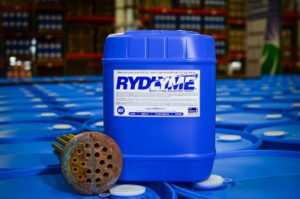What is a descaler?
A descaler is a solution used to remove a coating, layer, or crust (scales) from a surface. Despite the name, descalers have nothing to do with fish (or other animal) scales. Scale is made up of mineral deposits accumulated over time on a surface (usually an appliance or piece of machinery).

A descaler can be used on many surfaces including:
- Copper
- Iron
- Fiber
- Steel
- Brass
- Glass
- Nickel
- Rubber
- Plastic
- Ceramic
- Titanium
- Stainless Steel
Machinery that commonly needs descaling includes:
- Boilers
- Chillers & Condensers
- Heat Exchangers
- Heat Treating Machinery
- Plastics
- Pulp & Paper Machinery
- Tires & Rubber
- Vacuum Pumps
- Wastewater Facilities
- Tankless Water Heaters
Descaling chemicals and processes are typically tasked for industrial use. Descalers are formulated for more heavy-duty applications than a standard household cleaner.
Descaling & Mineral Deposit Fundamentals
Scale is the accumulation of minerals such as calcium and magnesium on the waterside of boiler heating surfaces. When boiler water turns to steam, residual minerals are left in the boiler. These minerals then settle out of the boiler water and form scale on the boiler heating surfaces.
If the water delivered to the boiler contains even small amounts of scale-forming materials, the internal heating surfaces of the boilers can soon become coated with scale, leading to overheating, increased fuel consumption and subsequent tube failures. Even light or spotty scale deposition can be the foundation for hot spots, cracking, and distortion. For this reason, regularly cleaning the interior of steam generator systems is imperative.
Boiler Maintenance & Mineral Formation
Boiler maintenance is crucial to the continued operation of your facility. One component to your boiler’s preventive maintenance program should be an annual cleaning to remove mineral scales that have accumulated within the boiler. These deposits are great insulators that inhibit heat exchange and cause the boiler to lose heat transfer.
For instance, as you can plainly see from our chart, scale that is only 3/16” thick will cause the boiler to use 27% more fuel! A common unknown fact is that boiler tube failures account for the majority of a power plant’s forced outages. This, all because the boiler may be from inadequate heat transfer.
Water scale deposited in steam boilers is usually harder and denser than deposits found in hot water boilers. This is due primarily to the temperatures involved. But even the smallest amount of boiler scale deposits hamper good over-all heating These mineral deposits may occur from poor blow down and/or poor water treatment practices.
Mineral deposits come from:
- Operating hours
- Feed water hardness
- Boiler treatment methods
- Feed-water control fluctuations
- Blow down techniques and procedures
What are Descalers Used for?
Descalers are typically used to prolong the life of various surfaces, appliances, and machinery. The most common use for a descaler is to remove limescale, rust, mud, and various metal oxides (iron, copper, etc) from equipment, enabling the machinery to function at an optimal level.
Descaling can be used to clear up blockages and mineral build-ups on a variety of surfaces. Metals and plastics–even glass–can all accumulate unwanted scale deposits over time.
Untreated mineral deposits can cause long term issues for industrial machinery. Regular descaling is used to make sure machinery is running at full capacity.
What Happens if I don’t Descale Equipment?
Failing to properly clean some industrial equipment with a descaler can lead to a few specific issues.
Machine and manufacturing temperatures can be greatly affected by mineral build-ups. Usually the heat from a boiler or heat exchanger won’t transfer at an optimal level if descaling is needed. This can lead to increased costs, as more energy is required for machinery to heat up to a given temperature.
Cooling towers and chillers can also suffer from untreated mineral deposits. Facilities housing large air conditioning networks or data centers can see a major uptick in energy costs if cooling systems aren’t properly descaled.
Regularly descaled industrial systems save money due to lower energy consumption. A descaled machine is a more valuable machine.
Are Descalers Safe?
It depends on what descaler you are handling. General descalers are safe for use if all safety guidelines are followed. Some heavy-duty or specialty descalers can be very acidic and require careful handling.
Many modern descalers contain a buffering agent that removes corrosive effects associated with acids used in some chemical descaling compounds. Again, make sure that you understand the uses and safety precautions associated with any industrial descaler you choose to use.
Biodegradable industrial descalers are cleared for disposal in normal plant sewers at any concentration. Be sure to dispose of any chemical descaler you are using in the proper manner (as not all descalers are biodegradable).
Some chemical descalers, specifically RYDLYME, are totally safe for accidental contact with the skin and have no transportation or handling restrictions.
RYDLYME The World’s Leading Biodegradable Descaler
For more than 80 years, RYDLYME has been the most trusted brand for removing scale from boilers, cooling towers, heat exchangers, condensers, chillers, and so much more. If you have further questions pertaining to the effectiveness of “The World’s Leading Biodegradable Descaler,” RYDLYME, please feel free to contact our main office.

